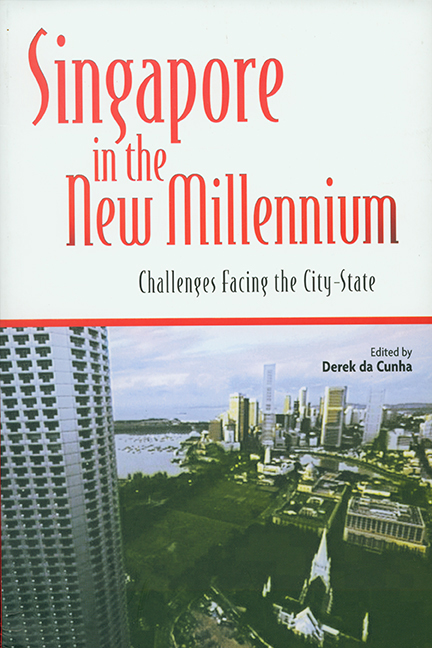Book contents
- Frontmatter
- Contents
- Preface
- Contributors
- 1 The Limits of a City-state: Or Are There?
- 2 External Challenges Facing the Economy
- 3 Governance: Its Complexity and Evolution
- 4 The Future of Civil Society: What Next?
- 5 Relating to the World: Images, Metaphors, and Analogies
- 6 Relating to the World: Images, Metaphors, and Analogies
- 7 Education in the Early 21st Century: Challenges and Dilemmas
- 8 Reframing Modernity: The Challenge of Remaking Singapore
- 9 National Identity, the Arts, and the Global City
- 10 The Media and the Flow of Information
- 11 Conclusion
- Index
1 - The Limits of a City-state: Or Are There?
Published online by Cambridge University Press: 21 October 2015
- Frontmatter
- Contents
- Preface
- Contributors
- 1 The Limits of a City-state: Or Are There?
- 2 External Challenges Facing the Economy
- 3 Governance: Its Complexity and Evolution
- 4 The Future of Civil Society: What Next?
- 5 Relating to the World: Images, Metaphors, and Analogies
- 6 Relating to the World: Images, Metaphors, and Analogies
- 7 Education in the Early 21st Century: Challenges and Dilemmas
- 8 Reframing Modernity: The Challenge of Remaking Singapore
- 9 National Identity, the Arts, and the Global City
- 10 The Media and the Flow of Information
- 11 Conclusion
- Index
Summary
1. Introduction
Singapore is sui generisas a sovereign city-state. Its very economic success is a bold contradiction of its geographical size. While the title of this chapter suggests some negativism, the subtitle is meant to provoke a revisit of traditional constraints of natural resources and resulting options and strategies. The chapter presents an alternative reassessment, given shifts in capabilities enabled by an internal reorientation of an open society, which has largely been a cause and effect of globalization and technology, especially information technology. The important change in mindset and psychology as a city-state is also moulded and sculpted as a response to the emerging environment. Both spatially and intellectually, the changing regional and international frameworks offer both opportunities and threats to Singapore as a city-state. To what extent and how can Singapore drive itself forward requires an intense scrutiny into the political economy of its viability and survival, and also the perceptions of others.
As Singapore is both a city-state and world city, a conceptual distinction between the two is a necessary preamble. Both geographical constructs exist on the same global extensions and networks, but a world city is perhaps less sensitive politically to how the regional or international hinterland gives it sustenance. A city-state connotes deeper economic, social, security. sovereignty, and political dimensions, and has to deal with them more explicitly, especially if other countries demand that it does. The world city hypothesis, and where Singapore stands, is discussed in Section 2 of the chapter. Singapore as a sovereign city-state, in both the traditional and new thinking, is sorted out in Section 3. The crucial domestic and regional implications of the convergence of both for Singapore are identified and discussed in Section 4. With Hong Kong a Special Administrative Region (SAR) of China, Singapore may well be alone as a city-state in its sovereign status. The issues and strategies of the political economy of a city-state are analysed in Section 5, and some policy suggestions are tendered in the concluding section.
- Type
- Chapter
- Information
- Singapore in the New MillenniumChallenges Facing the City-State, pp. 1 - 25Publisher: ISEAS–Yusof Ishak InstitutePrint publication year: 2002

